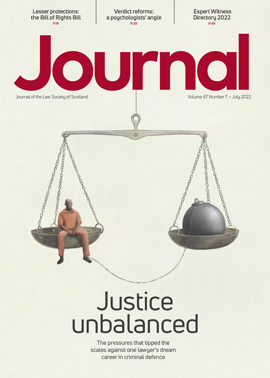Insolvency: How to admit joint creditor claims
Adjudication of a creditor’s claim in a sequestration is very important. It determines the sum which the creditor is entitled to be paid in the event that a dividend is available, and voting rights at creditors’ meetings. In Akhter v Accountant in Bankruptcy [2022] SC GLW 13 an appeal was taken by creditors against a review by the Accountant in Bankruptcy (“AiB”) of an adjudication, after the AiB determined that the trustee’s adjudications had been incompetent and revoked them.
The sheriff’s judgment is a useful summary of how adjudication should be approached where loans are advanced jointly by more than one creditor. It also approves the approach of the sheriff in Reid v Accountant in Bankruptcy [2019] SC ABE 52. This was the subject of a previous briefing (Journal, July 2019, 34) concerning the difference between a “review” (where the AiB can consider the whole matter ab initio) and a more restrictive “appeal”.
Background
The debtor was sequestrated in March 2018. In October 2020 the trustee adjudicated on submitted creditor claims. These included loans advanced by the three sets of appellants in this case. Their debts were admitted in full.
In the case of the second and third appellants, loans had been advanced by two creditors jointly. The trustee allowed each of the joint creditors to submit claims for the full amount of the loan. The trustee recognised that this meant each loan was admitted twice, stating that any dividend ultimately paid would not exceed the value of the loan.
The petitioning creditor requested a review by the AiB, arguing that the loans were by parties closely connected to the debtor and were fictitious.
On review, the AiB revoked the adjudications in respect of the three loans. For the first loan, the AiB was satisfied that a loan of £55,000 had been advanced. They noted there was no evidence regarding the current balance of any of the loans. Significantly, they also held that in respect of the second and third loans the trustee’s approach to joint creditors was incompetent. Where two or more creditors advanced a loan jointly, either a single claim required to be made, or if the creditors preferred individual claims, the total value of individual claims could not exceed the loan amount.
The creditors appealed.
Basis of appeal
The appellants challenged on a number of grounds:
- The application for review ought not to have been accepted, as it was not advanced on statable grounds.
- The revocation was made on grounds not argued for by the petitioning creditor.
- The AiB was not entitled to revoke decisions based on their own interpretation of facts already determined by the trustee.
- Basing revocation on the non-production of evidence inverted the burden of proof in relation to creditors’ claims.
- The AiB had misinterpreted their powers: amendment of the adjudication was the appropriate course, not revocation.
The judgment
Regarding the first three grounds, the sheriff identified that the Act did not prescribe any form of application for review. In fact, the application need not state any grounds at all. Given that a review allowed the AiB to consider the matter ab initio, it was clear that the AiB could base their decision on any grounds they saw fit arising from the facts and circumstances. These elements of the appeal accordingly failed.
In relation to the fourth ground, the sheriff held that the AiB was entitled to consider all material provided and make a decision about acceptance of the claim. It was apparent that the AiB had considered the limited evidence that the full debt remained outstanding, but considered it insufficient. Notably, had they failed to consider a matter of relevance, the sheriff could have interfered.
On the fifth element, if the AiB was entitled to revoke rather than amend the adjudication, the court held that the AiB took the correct course. The sheriff agreed with the conclusion that the adjudication of the joint creditors’ claims was incompetent. The effect of the adjudication was that loans were being claimed twice, inflating the claims in the estate, which might disadvantage other creditors in relation to voting rights. It was not cured by the trustee agreeing not to pay out more than the loan. The correct course was either to have a joint claim by the creditors, or if the debt was divisible, to lodge two claims in the relevant proportions not exceeding the loan amount.
In those circumstances amendment could not cure the incompetency and the AiB was right to revoke.
Perspectives
Features
Briefings
- Civil court: Issues on appeal
- Licensing: Minimum pricing – a genuine impact?
- Insolvency: How to admit joint creditor claims
- Tax: windfall and plastic packaging taxes raise stakes
- Immigration: Asylum system overhauled
- Scottish Solicitors' Discipline Tribunal: July 2022
- In-house: In with the stonework
- Property: Living with the Register of Overseas Entities
In practice
- OPG update: July 2022
- Public policy highlights: July 2022
- Gear up for the Scottish Legal Walks
- Disabled solicitor support group proposed
- Risk: Cybercrime – the hybrid worker prey
- Ask Ash: Piling it on
- TRS: time for a trusts trawl
- Know people, know business
- High street and hybrid
- Appreciation: Ian Leslie Shaw Balfour
- The Expert Witness Directory 2022
- Expert witness: case law update







